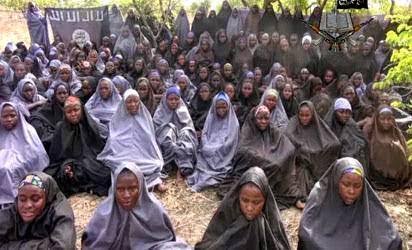
Two hundred and seventy-six girls were heard screaming in the dead of the night as they were brutally dragged into awaiting vehicles by an extremist group called Boko Haram in a small village in Borno State.
Nothing had prepared them for this heinous moment due to their fragile mental state as adolescents. They were just school children between the ages of twelve and seventeen, and they were taken to Sambisa Forest after a 3-day journey.
Even though 57 of them managed to jump off the vehicles because they were moving at a slow pace, others who were too scared to flee must have had a glimmer of hope that the government would rescue them. Their hopes were dashed before their eyes because the government of the day had failed them.
But on Sunday, April 14, 2024, the abduction of the Chibok girls re-echoed as it clocked a decade. According to Arise TV, ninety-one of these schoolgirls are still held in captivity, although some are feared dead as they may have been used for suicide missions.
In assertion, an advocate for Bring Back Our Girls (BBOG), Emman Shehu, lent his voice to the AFP News Agency to express displeasure over the negligence towards the Chibok girls after ten years.
Read Also: Rapists Should Face Death Sentence – Barr Emem Ette
“We have failed them, the Nigerian community has failed them, and the international community has also failed them. Everybody has failed these girls; there is no doubt about it.”
However, some of their parents, especially the mothers, still have a little hope that their little girls will still return home even after 10 years.
Mary, the mother of Margaret, is one of the expectant parents who are hopeful that her little girl will still come back home regardless of the (jadedly distrustful) cynical scenarios of negligence created by the Nigerian government.
Speaking to AFP News Agency, Mary said, “If I hear footsteps, I still think it is my daughter coming back; sometimes I let my hair loose and imagine her plaiting them. I have been waiting and waiting.”
Delving into the survivors’ tragic stories of how they coped with the dreaded Boko Haram terrorists at the camp, these girls turned into young adults who said they were compelled to marry these criminal elements while some of them were sold out as sex slaves.
These ladies disclosed that they were battered, deprived of food and were sexually assaulted a lot of times, even in the process of escaping to their home town.
To commemorate the abduction of the Chibok girls after 10 years, one of the girls who escaped from the camp recounted as she spoke on PBS News Hour, Ya kaka, saying, “Before my abduction by the extremist group, I watched how the throat of my father was sliced with a knife in my presence, and he was killed instantly, and when my stepmother tried to intervene, she was also killed as well.”
“While in the Sambisa Forest, my first husband, who abducted me, always had sex with me and later sent me naked into the camp. Other insurgents would drag me and have sexual intercourse with me as well.
Read Also: Gov. Eno’s Aide Calls For National Integration, Commends US Govt.
This became my daily life but I delivered a baby boy before escaping the camp.”
To Mauwa, she was nine months pregnant when she escaped at night.
“I had to escape because I had no one to take care of me, even with my condition. I had to trek in the bush for seven days before arriving at a deserted village where I saw an old woman who helped me.”
Mauwa said that after giving birth to her daughter, she had to leave the old woman’s house because she feared she might be caught by the extremist group so she ran for her safety.
“After a three-day journey to my hometown, Bama, my daughter took ill and died in my arms. I had to wrap her in the cloth the old woman gave me and bury my child.”
Disclosing her ordeal to AFP News Agency, Grace, who is one of the Boko Haram survivors, said that she is still haunted by the memories in Sambisa Forest. “These people destroyed my life; if they had not taken me into the bush at age 17, my life would have been much better than it is today.”
While escaping from the terrorist camp, Ya Kaka, unfortunately, encountered another ordeal at the camp for displaced people at Illorin.
According to her, “I joined other three girls to escape in the night because we could not condone the suffering anymore at the terrorist camp. We trekked to Maiduguri, and a soldier picked us up and dropped us off in the displacement camp at Illorin.
“The feeding was a problem, you hardly get food to eat, I even went two days without food. Aid materials are often finished before my turn.
“Another problem we usually have is that in the evening, after aid workers have left the camp, leaving us with soldiers and other agencies, soldiers often go to each room, demanding sex.
“It is better you accept it or you will be intimidated and dealt with. So when I discovered this issue, I realised I had left a problem and jumped into another problem.”
Another development in this situation is that the girls are facing discrimination once they return home. They were not as acceptable as they thought they would be; the society they once called home hauled their stones on these survivors, tagging them “the ex-wives of Boko Haram.”
Amina Ali, who came back after two years with her four-month-old baby girl, had difficulty reintegrating into her community. She was rejected by her people.
Recalling the hatred, Mauwa said she was often called “the ex-wife of Boko Haram,” and it was traumatising.
“By the time I escaped to Maiduguri, I decided to stay in the host community, but unfortunately, nobody was willing to accommodate me. Nobody wanted me around, and they were not happy that I was living there.
“I had only one dress set; I had to wash and dry it and wait somewhere nude until the cloth was dried off for it to be worn.”
The girls, who have escaped from the terrorists’ camp just like Ali and Mauwa, are devastated because of the societal rejection.
Stating the societal stigmatisation, the co-convener of Bring Back Our Girls, Aisha Oyebode, on Arise TV said, unfortunately, that there is no post-abduction protocol structured in these communities to enable the survivors to be reintegrated into society without discrimination.
“Unfortunately, there is no preparation in place by the government on how to receive the Chibok girls when they return.”
Despite the thunderous advocacies done by non-profit organisations to rescue the Chibok girls who are still in captivity, it’s like their efforts have fallen on deaf ears as insecurity issues in the country continue to have the green light.
The ordeal of the Chibok girls is a tragedy for the Nigerian situation. The co-convener of BBOG and former minister of education, Oby Ezekwesili, explained on Arise TV that this tragic situation is the epitome of the serial failure of the government to meet the needs of the most vulnerable and poorest citizens in the country.
Speaking further, Ezekwesili said, “What happened to the Chibok girls would have never happened to the elites of society because the privileged class has the proclivity of choosing itself over those they are supposed to serve.”
To tackle this situation of rescuing the Chibok girls who are still held in captivity after 10 years, the former minister admonishes the present administration to account for the Chibok girls who are missing, disclose all the reports of panels that were set up, and publish them to show transparency.
She also added that the government should ensure that they meet the parents of the missing girls every quarter to discuss the strategic steps the government is taking towards rescuing their children.




